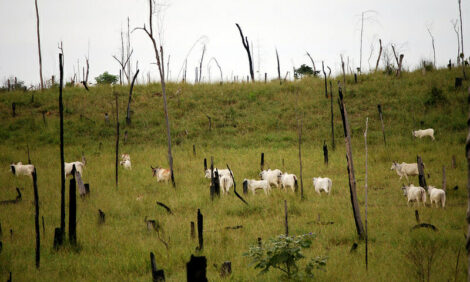



A Natural Way: Host Resistance Against Cattle Ticks
AUSTRALIA - A young scientist from Queensland hoping to discover a clean, green way of controlling cattle ticks has received a prestigious Early Career Scientist award.Presented at the Cooperative Research Centre Association’s (CRCA’s) Annual conference, the Early Career Scientist Award recognizes the work of some of the brightest PhD students in the country. Emily Piper, a University of Queensland PhD student working with the Beef CRC, was one of eight finalists nominated for the accolade.
Ms Piper’s work has the potential to save the northern Australian cattle industry millions of dollars in lost productivity and chemical control.
* "Currently producers use synthetic insecticides to control the cattle ticks but they are costly and can possibly leave residues in food products and the environment." |
|
Emily Piper, a University of Queensland PhD student
|
Her research focuses on identifying the mechanisms responsible for “natural” host resistance against cattle ticks.
“Currently producers use synthetic insecticides to control the cattle ticks but they are costly and can possibly leave residues in food products and the environment,” said Ms Piper.
“Some breeds of cattle such as the Brahman are naturally more resistant to the cattle tick and ticks will die rather than feed on them. So far, I’ve been able to show that Brahman animals have a different profile of immune cells to that of the susceptible Holstein-Friesian animals.
She said once they know what kind of immune response is important for high levels of tick resistance, they’ll be one step closer to developing an immune assay to predict tick resistance or susceptibility. “Producers in tick-endemic areas of Australia will then be able to make breeding decisions based on resistance to the pest,” she said.
Michael Hartmann, CEO of the CRC Association said Emily’s work is a great example of what can be achieved through the collaborative research.
“While the CRCs are recognized as the engine room for collaborative innovation, they are also the breeding ground for Australia’s next generation of innovators. A key outcome of the CRC program is the development of highly skilled and industry ready graduates across a myriad of industry sectors”, said Michael Hartmann.
“The finalists in this year’s CRC Association’s Early Career Scientists Awards have made practical discoveries with application in industry, agriculture and the environment,” Mr Hartmann said. The CRC Association represents 58 CRCs which specialise in a broad range of sciences, technologies and industries. The hub of applied research in Australia, CRCs aim to increase collaboration between researchers and industry and better promote the uptake and use of research.
TheCattleSite News Desk


